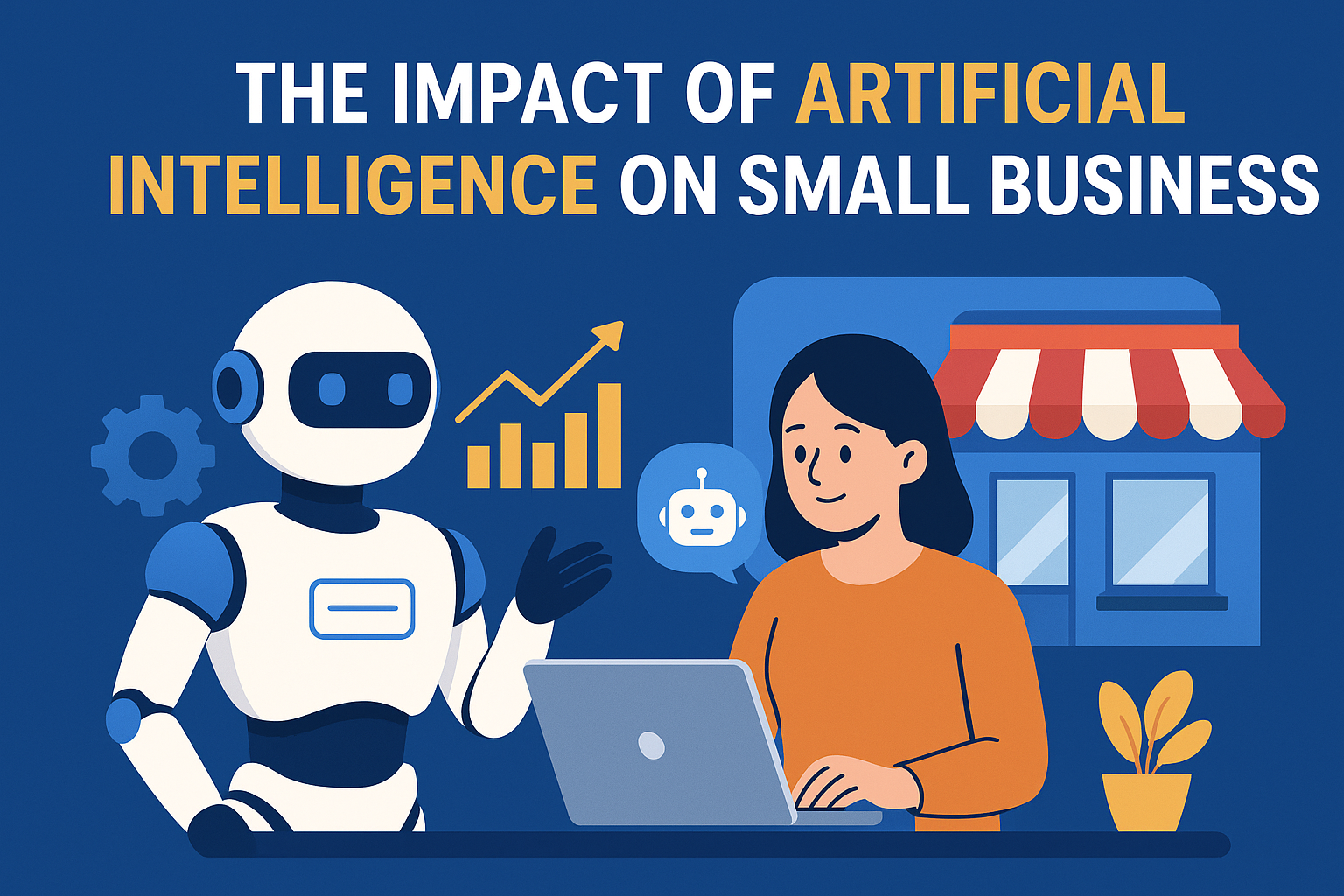The Impact of Artificial Intelligence on Small Businesses 🤖📈
Introduction: Why AI Matters for Small Businesses 🤔
Artificial Intelligence (AI) is no longer reserved for tech giants like Google or Amazon. Today, small businesses are also leveraging AI to streamline operations, reduce costs, and improve customer experiences. Think of AI as a digital co-pilot—helping entrepreneurs fly higher without burning out.
What is Artificial Intelligence? 🔍
Artificial Intelligence is the replication of human thinking and decision-making abilities in computer systems.
In simple terms, it’s when computers learn, reason, and make decisions almost like humans. From chatbots to predictive analytics, AI is now a practical tool for small businesses.
AI vs. Traditional Business Tools ⚡
Traditional tools often rely on manual effort. AI, on the other hand, automates repetitive tasks, identifies trends, and delivers data-driven insights—saving time and boosting productivity.
How AI Levels the Playing Field for Small Businesses 🏆
Big corporations once had an edge with massive budgets. But AI is breaking that barrier by giving small businesses affordable access to advanced technology. This levels the playing field and allows small players to compete with industry giants.
AI in Customer Service: Chatbots and Virtual Assistants 💬
Customer service can be expensive and time-consuming. AI chatbots answer FAQs 24/7, while virtual assistants handle routine queries, leaving human employees to focus on complex issues.
AI in Marketing and Sales 📢
Personalization and Targeted Campaigns 🎯
AI analyzes customer data to create personalized experiences. For example, AI can recommend products based on browsing history—just like Netflix suggests shows.
Predictive Analytics for Better Sales Forecasting 📊
AI can forecast future sales trends by studying past behavior, helping businesses manage stock, set targets, and avoid over/underestimating demand.
AI in Inventory and Supply Chain Management 📦
Small businesses can struggle with inventory management. AI systems track stock in real-time, predict shortages, and optimize supply chains—minimizing costs and delays.
Boosting Productivity with AI Automation ⚙️
Automation powered by AI takes care of routine tasks such as scheduling, sorting emails, and managing workflows.
This saves hours of manual effort and improves efficiency.
AI in Financial Management 💰
Automated Bookkeeping 📑
AI tools like QuickBooks or Xero automate invoicing, payroll, and expense tracking, reducing human error.
Fraud Detection 🔐
AI can spot unusual transactions instantly, protecting businesses from fraud and financial risks.
Enhancing Customer Experience with AI 🌟
Happy customers are loyal customers. AI provides personalized product recommendations, faster responses, and data-driven support—all of which improve the overall customer journey.
AI-Powered Insights for Smarter Decision-Making 🧠
Instead of guessing, small businesses can use AI dashboards to track performance metrics and predict future opportunities. Data-driven decisions replace “gut feeling” strategies.
Challenges Small Businesses Face in Adopting AI 🚧
While AI is powerful, challenges include:
-
Cost of implementation 💸
-
Lack of technical expertise 👨💻
-
Data privacy concerns 🔒
Affordable AI Tools for Small Businesses 💡
Thankfully, affordable AI tools exist:
-
ChatGPT – Content creation and customer support
-
HubSpot – AI-driven marketing automation
-
Zoho CRM – Customer relationship management
-
Grammarly – AI-powered writing assistant
The Future of AI in Small Business Growth 🚀
AI adoption will only increase. Soon, AI won’t just be an option—it’ll be a necessity. Businesses that embrace it today will stay ahead of competitors tomorrow.
Conclusion: Embracing AI as a Growth Partner 🤝
Artificial Intelligence is more than just technology; it’s a partner for growth. For small businesses, AI means smarter operations, stronger customer relationships, and a brighter future. The key is not whether to adopt AI, but how quickly you can.
FAQs ❓
1. How can AI benefit small businesses with limited budgets?
AI tools are now affordable, and many offer free or low-cost plans tailored for small businesses.
2. Will AI replace human jobs in small businesses?
Not entirely. AI handles repetitive tasks, but humans remain essential for creativity, strategy, and personal interaction.
3. Is AI difficult to implement for non-tech entrepreneurs?
Not at all. Many AI tools are designed for beginners and require little to no technical expertise.
4. What industries benefit most from AI adoption?
Retail, hospitality, healthcare, and e-commerce are currently leading in AI adoption, but all industries can benefit.
5. What’s the biggest risk of using AI in small businesses?
The main risks are data privacy concerns and over-reliance on technology without human oversight.
 Helpful Internal and External links
Helpful Internal and External links
How to Get Started with AI: A Beginner’s Guide for Small Businesses
